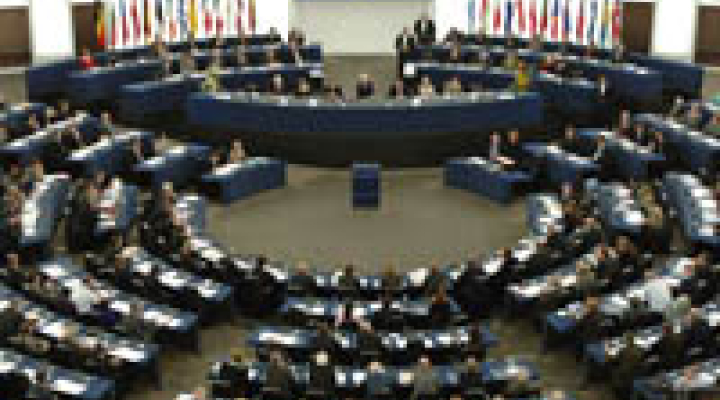All the citizens of Europe deserve the same appreciation and treatment
DAHR’s MEP Csaba Sógor (drew attention to) reminded about the rights and
living conditions of national minorities in the West-Balkans in his
remarks during one-minute speeches on the opening day of the plenary
sitting of the European Parliament in Strasbourg, on July 5. In his
opinion some third countries ensure more freedom for the language use of
these communities that the member states.
DAHR’s MEP Csaba Sógor (drew attention to) reminded about the rights and living conditions of national minorities in the West-Balkans in his remarks during one-minute speeches on the opening day of the plenary sitting of the European Parliament in Strasbourg, on July 5. In his opinion some third countries ensure more freedom for the language use of these communities that the member states.
„The accession of Central and Eastern European countries to the EU and the extension of the enlargement process to include the Western Balkan countries are considerable challenges for the EU. Economic issues are often discussed. I would now like to talk about a factor which we tend to overlook. These countries have a large number of national minorities. These minorities did not immigrate to these countries. Instead, they became citizens of another country for historical reasons, due to frequent border changes.
Very often, the language-related rights of minorities are regulated with more generosity in non-EU countries than in certain EU Member States. This is because these countries have realized that it is in their best interest to make minorities feel at home in their homeland. This is certainly an area where EU Member States could learn a lot from candidate states. Every citizen of the European Union deserves equal respect and treatment regardless of ethnic origin, nationality or mother tongue.”
On July 7 a debate followed the report of the European Commission on the situation of Kosovo and Albania. Views in the matter were divided amongst the MEPs. The Belgian presidency of the EU considers the solution of the problems of the western Balkans as a priority and supports the independence of Kosovo, although some MEPs expressed about this intention. Five member states do not acknowledge Kosovo as an independent state and views it as a potential threat, an infringement of international law.
Here is Csaba Sógor’s speech in the debate:
„Western Balkan states are in an extremely difficult situation. The ethnic factor and relations between the majority and minorities have a considerable negative effect on development in the region. It is clear that the European Union cannot ignore the problems of these countries as the region has particular significance for the enlargement process. It is, however, unfortunate that while we agree on the importance of having a common voice in foreign policy and a common position on the part of Member States in order to enhance the EU’s international role, what we see is that Kosovo, the youngest state in the world, has still not been recognized by five EU Member States. The future of Albania and Kosovo, but also of Bosnia and Herzegovina, Montenegro and Serbia depends on the circumstances of their accession to the European Union in the near or distant future. It is in our common interest to make sure that this integration is a success story. This is why it is imperative for us to reach a common position on the most important issues.”
„The accession of Central and Eastern European countries to the EU and the extension of the enlargement process to include the Western Balkan countries are considerable challenges for the EU. Economic issues are often discussed. I would now like to talk about a factor which we tend to overlook. These countries have a large number of national minorities. These minorities did not immigrate to these countries. Instead, they became citizens of another country for historical reasons, due to frequent border changes.
Very often, the language-related rights of minorities are regulated with more generosity in non-EU countries than in certain EU Member States. This is because these countries have realized that it is in their best interest to make minorities feel at home in their homeland. This is certainly an area where EU Member States could learn a lot from candidate states. Every citizen of the European Union deserves equal respect and treatment regardless of ethnic origin, nationality or mother tongue.”
On July 7 a debate followed the report of the European Commission on the situation of Kosovo and Albania. Views in the matter were divided amongst the MEPs. The Belgian presidency of the EU considers the solution of the problems of the western Balkans as a priority and supports the independence of Kosovo, although some MEPs expressed about this intention. Five member states do not acknowledge Kosovo as an independent state and views it as a potential threat, an infringement of international law.
Here is Csaba Sógor’s speech in the debate:
„Western Balkan states are in an extremely difficult situation. The ethnic factor and relations between the majority and minorities have a considerable negative effect on development in the region. It is clear that the European Union cannot ignore the problems of these countries as the region has particular significance for the enlargement process. It is, however, unfortunate that while we agree on the importance of having a common voice in foreign policy and a common position on the part of Member States in order to enhance the EU’s international role, what we see is that Kosovo, the youngest state in the world, has still not been recognized by five EU Member States. The future of Albania and Kosovo, but also of Bosnia and Herzegovina, Montenegro and Serbia depends on the circumstances of their accession to the European Union in the near or distant future. It is in our common interest to make sure that this integration is a success story. This is why it is imperative for us to reach a common position on the most important issues.”











